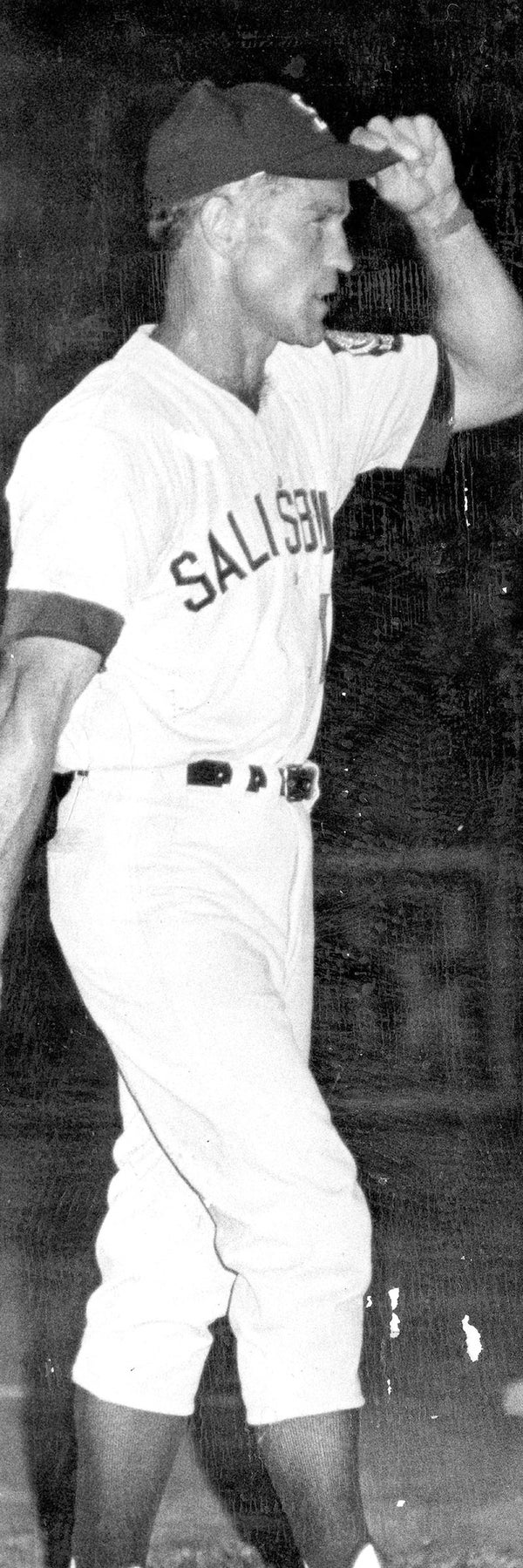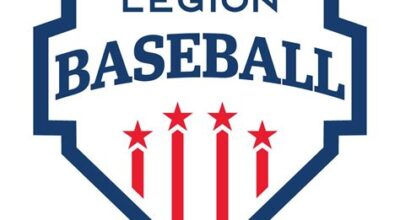Legion baseball: Run to ’55 World Series got ball rolling in Rowan
Published 12:20 am Wednesday, July 22, 2015

- Salisbury Post file photo Joe Ferebee, shown coaching the Salisbury American Legion baseball team, was at the helm for the area’s first North Carolina championship team. Ferebee, 95, was the head coach of the Salisbury and Rowan County teams for a span of 30 seasons over 40 years. His teams won four American Legion state championships.
SALISBURY — Tom Eaton weighed 98 pounds as a sophomore at Salisbury’s Boyden High, and football practice wasn’t much fun.
Baseball was his sport, but his friends played football, so Eaton, who had more guts than sense, was out there too.
“I felt like a turtle when I put on a helmet,” Eaton said. “Football practice was killing me. I’d wake up every morning praying that it would rain.”
Football coach Bill Ludwig was as wise as he was stern and called Eaton into his office.
“He told me it was unusual for him to tell someone to quit football, but it would be in my best interest because I might get hurt and I had a good future as a pitcher,” Eaton said. “He told me I could be the manager. I could still be at football practice every day and travel on the bus to the games with my friends.”
It was a great decision. Eaton stayed in one piece, and the lightning bolts in his left arm were the biggest reason coach Joe Ferebee’s 1955 Boyden High baseball team won the state championship.
That summer, Salisbury Post 14’s American Legion team did something even bigger. That Ferebee-coached team won Area III, won the state tournament, won the regional, won the sectional and rode a train to St.Paul, Minn., where they finished third in the Little World Series.
Eaton and three of his surviving teammates are 77 now, but that team remains the most famed baseball club in Rowan County history. Ferebee’s coaching career in Legion, college and high school was unbelievable, but he’s always called the 1955 run to the World Series the highlight of his 1,438 victories.
“That’s the team that made Legion baseball what it is here today,” said Post 14 center fielder Alvin Smith.
Smith had a recent conversation with Jim Gantt, the coach who guides Rowan County’s current American Legion team.
“He told me we set the bar high for all the teams that followed,” Smith said. “That made me feel good.”
Thirty candidates tried out for the 1955 Legion team. Ferebee cut the squad down to 15, including nine members of Boyden’s state champs. Third baseman Richard Snider and pitcher Sonny Lippard came from China Grove. Three players were from Granite Quarry, including catcher Virgil Bernhardt.
“Virgil was our rock,” said Ned Storey, a pitcher on the 1955 team.
The final piece of the puzzle was shortstop Butch Allie. Allie lived in Statesville and his brother, Gair, had played in the major leagues. Statesville didn’t have a Legion team, and Mocksville granted Allie a release to play for Salisbury.
While the 1955 team is remembered for Eaton’s 15 wins and 219 strikeouts — still program records — it also could hit. Bernhardt reached Double-A ball in the minors. Snider pounded 22 homers in a minor-league season and possessed enormous power.
“Richard could hit balls in the woods,” Smith said.
Salisbury second baseman Paul Roberts had a 23-homer season in the minors and was a good enough athlete that Georgia Tech pursued him for football. Allie went on to become a fine football player at Duke.
Snider batted .356 with 50 RBIs for the 1955 Legion team. Bernhardt batted .359, first baseman Jerry Hillard hit .322, and Allie batted .310.
“It was a strong team,” Eaton said. “We could’ve been even better, but Spencer had their own team. Bobby Rusher, Cecil Mulkey, Larry Goodman — Spencer had some good players.”
1955 was a simpler time.
“We traveled to our games in station wagons, five or six to a car,” Storey said.
Teenagers worked, played ball and obeyed coaches they respected. Smith said the only tom-foolery came in the form of a few unauthorized skinny-dipping sessions.
Ferebee had a unique style.
“I’ll never forget him walking in to the locker room wearing nothing but a jock strap and showing us exactly how we were going to dress, starting with socks and stirrups,” Smith said. “He wanted us to look like good ballplayers.”
Ferebee put his starters on the field for nine innings.
“Every position, including pitcher,” Smith said. “If you started the game, he expected you to finish.”
Salisbury won Area III in 1954 and went 21-6. So it entered the 1955 season with expectations.
Eaton was ready. In the first league game, he fired a one-hitter and struck out 17 Spencer hitters.
Salisbury played in a five-team division with Spencer, Mocksville, Lexington and Winston-Salem. Post 14 was swept home-and-home by Winston-Salem and settled for second place in the regular season.
It wasn’t a special beginning, but it’s the playoff charge old-timers remember. Salisbury won 22 postseason games to finish 30-12.
The season was in danger of ending when Mocksville beat Eaton in the opener of a best-of-three first-round series. But Salisbury outslugged Mocksville to win Game 2. After losing a coin flip for home field, Salisbury went to Mocksville and won Game 3 behind Lippard. That decisive game was tied 2-2 in the eighth when Snider knocked in Smith.
Salisbury survived another Game 3 in a best-of-three series and beat Winston-Salem in the second round. Eaton won both his starts, striking out 26.
Eaton, who had his weight up to 129 pounds, was as wild as he was fast. Often he would walk the bases loaded before fanning the next three hitters.
“Tom’s wildness was a big part of his effectiveness,” Storey said with a chuckle.
The story goes that Ferebee’s wife rarely missed a game, but she was absent one night, and anxiously asked the coach who won as soon as he arrived home.
Eaton said Ferebee told his wife Salisbury won and “Tom pitched really good. He only walked 15.”
“Virgil Bernhardt had to be the greatest catcher ever,” Eaton added. “I bounced a lot of balls up there. Virgil was black and blue, but he kept on catching me.”
Winston-Salem had been undefeated, so Post 14’s victory lit a fire among Salisbury baseball fans. Crowds grew as Salisbury swept Burlington for the Area III title. The sheriff and mayor led the cheers at Newman Park. Dr. Clyde Young blew bugle charges.
Then Salisbury roughed up Shelby four games to one in the Western N.C. championship series.
“When the Shelby fellows first saw Tom they were looking their chops because he was small and our ballpark was small,” Smith said. “They were doing some talking. About the fourth inning, I passed one of them and asked him what the scoreboard said.”
Salisbury advanced to the state championship series against Wilmington. Salisbury had to score a ton of runs to take a fierce series that went six games. Salisbury won two 13-11 games. One game was a 19-error affair that ended at 12:15 a.m.
Next, Salisbury moved on to a four-team regional that it hosted at Newman Park. Eaton shut out the Kentucky champions, No. 2 pitcher Tom “Whitey” Baker shut out Richmond, Va., and then Salisbury beat Virginia again behind Eaton to win the regional. Eaton threw often and piled up mind-boggling pitch counts, although no one counted pitches in those days.
“My arm didn’t hurt,” Eaton said. “My mother was a nurse and she’d rub ointment on my arm after every game.”
Eaton’s legend grew larger in the sectional tournament in Sumter, South Carolina. He not only threw a no-hitter against North Charleston (S.C.) in the opening game, he hurled in all three games Salisbury played against New Orleans to decide the championship. He lost the first one in relief. He won the next two, and Salisbury was headed to the World Series.
A crowd of 2,500 cheered on Post 14 as it left the train station bound for Minnesota. The team stopped off in Chicago along the way, and a telegram signed by 1,200 fans greeted the boys when they arrived at the Hotel Capri.
On Aug. 31, Smith walked to the plate as the first batter in the World Series.
“The umpire called a strike on me, and I turned around to look at him,” Smith said. “He said, ‘Don’t do it, son. You’re in the big time now.'”
They did OK in the big time. Salisbury won once in the double-elimination event, beating Lincoln (Neb.) 6-3. That was the game in which Eaton collapsed from a muscle spasm in his chest. Lippard was able to finish the victory, but Post 14 lost Eaton for the rest of the tournament.
“People forget we could’ve won either of the games after I got hurt, ” Eaton said. “We didn’t get the breaks.”
Against Washington, D.C., Salisbury had two runners thrown out at home and lost 7-6 on a wild pitch in the ninth. The season-ending loss to national champion Cincinnati hurt more. Smith’s two-run double gave Salisbury a 5-2 lead in the top of the 10th, but Cincinnati got four runs in the bottom half.
The 1955 team settled for third place. Post 14 traveled home broken-hearted, but fans packed the railway station to salute their returning heroes. American Legion baseball had changed forever in Rowan.
Five of those boys of summer are gone now. Bernhardt, Baker, right fielder Milt “Lucky Strike” Clement, and Bill Eaton, Tom’s younger brother, died years ago. Allie passed away in 2012.
For the upcoming state tournament, Ferebee (still going strong at 95), Smith and Eaton have been lined up to toss out ceremonial first pitches.
The summer of 1955 was a long time ago, but it hasn’t been forgotten.
“Tom Eaton was one of the best pitchers the Legion team has ever had,” Storey said.





